‘I have two months left to live, but I will not condemn my toddler to a lifetime of grief’

Today, the week of my 43rd birthday, I know that I have at most only two or three months left to live. I am dying from terminal bone cancer. But in a strange way, the knowledge that my life is coming to an end makes me “privileged”. It has given me the opportunity to really live, to make the most of every moment.
It’s not the pain or fear of death that worries me most, it’s leaving my wife and my toddler daughter. Elizabeth is just two-and-a-half, and she will have to grow up without me. She is already a true daddy’s girl – we share incredible hugs, she misses me when I’m at the hospital, and greets me with her toy stethoscope, saying how brave I am. The thought of missing her first day of school, of not giving a speech at her wedding, buries me with emotion.
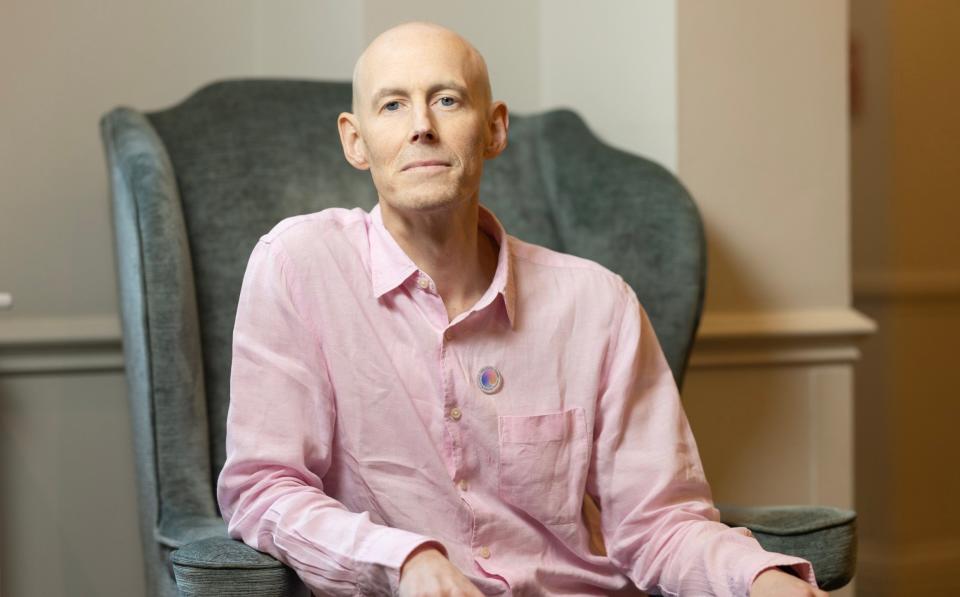
I’d already been diagnosed with cancer by the time Elizabeth was born, but I never imagined our time together would be so fleeting.
I’m from the West Country and now based in Washington DC, but my diagnosis came out of the blue four-and-a-half years ago, when I was living in Singapore where my wife Nancy, 38, hosted a CNBC news show.
After a successful career as an entrepreneur, founding Nutmeg, a private client investment management company, it was easy to move with her. For two years we had a wonderful life, travelling around Asia together.
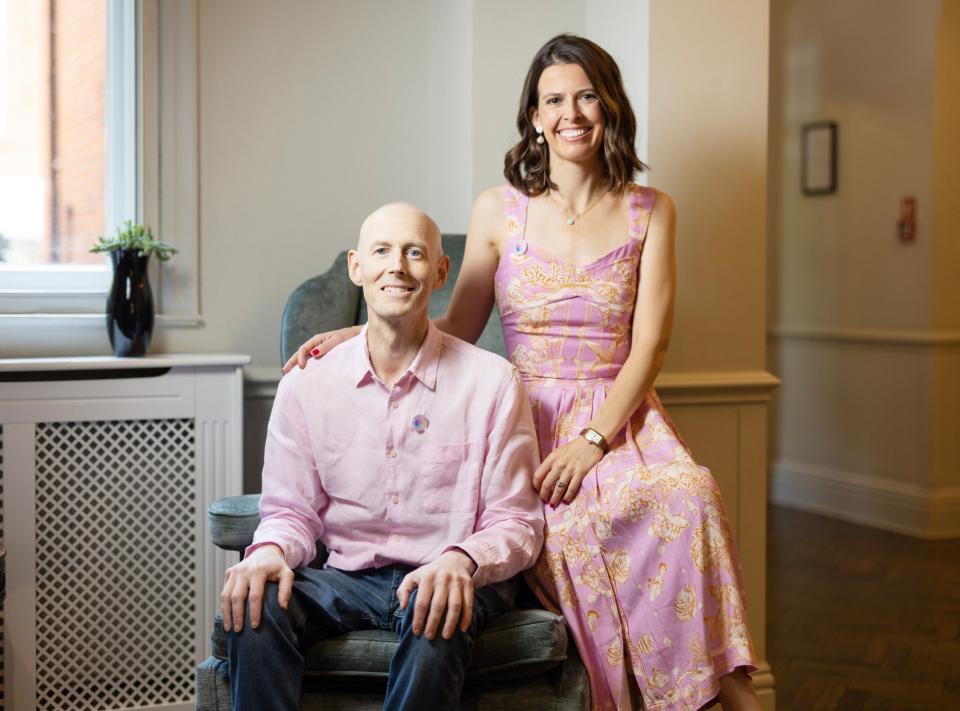
In December 2019, I started experiencing pain in my right thigh. A fit, athletic man, I thought I’d pulled a muscle.
I tried sports massages and creams but they didn’t work. Eventually I went to hospital where doctors identified something inside my leg, and operated to remove some nasty-looking gunk from my thigh. It was declared a success because it was not malignant, to my relief, and they sent me home.
Four weeks later, I was in such terrible, relentless pain that I ended up in the emergency room. Poor Nancy heard me screaming under the X-ray machine. A scan revealed a 13-centimetre tumour in my femur and a diagnosis of Ewing sarcoma, a very rare bone cancer, usually affecting children and young people. I was in shock. There’s no history of bone cancer in my family. I didn’t think of death, but of what my treatment might entail and how I’d cope. Treatment involved 10 months of chemotherapy and radiotherapy – during the strict Covid lockdowns. This was followed by surgery to remove my femur, which was replaced with titanium, and yet another course of chemotherapy.
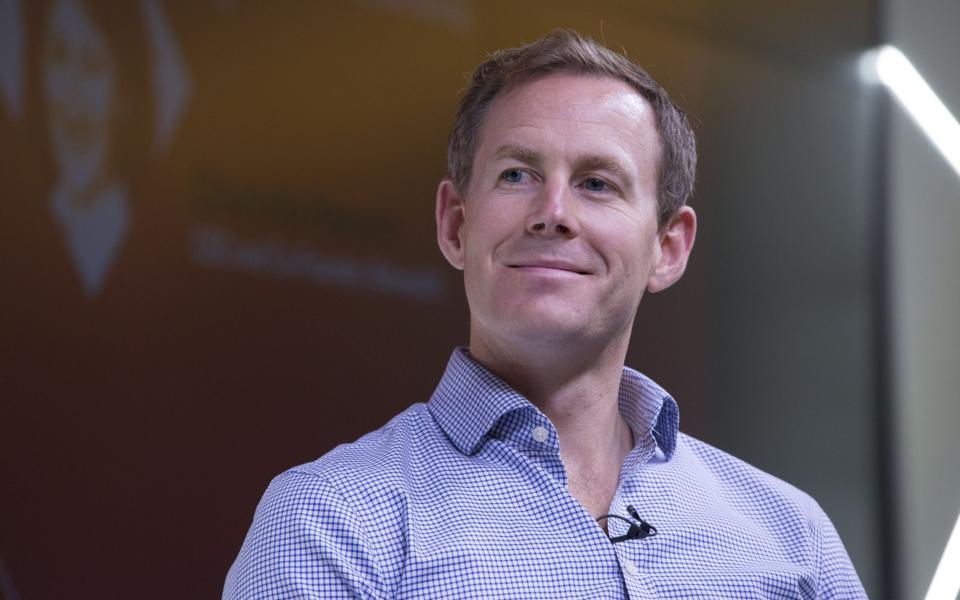
I chose not to have my leg amputated from the hip, as there was no evidence that the cancer had spread, yet the surgery took my hamstring and three of my four quads, leaving my right leg defunct. Looking at myself in the mirror was tough, I was gaunt after losing 20kg. Despite lots of physiotherapy, I wear a leg brace and rely on crutches and wheelchairs to get around. It’s difficult, but better than not having a leg.
Before treatment began, I was dealt another blow: chemotherapy would destroy my fertility. I’d always imagined having a family with Nancy, but the only way we’d have a baby was through IVF. After several attempts, we were delighted to welcome Elizabeth in December 2020. After a difficult birth, she was rushed to intensive care. She’d swallowed meconium and had severe meconium aspiration, so they kept her in for 10 days until she could breathe on her own. It was all highly traumatic, particularly as Covid meant only one of us was allowed to see her for 20 minutes a day. But she was a fighter.
I was determined to be there for her, and at that point there was no reason to think the sarcoma would return. So for a few months in 2021, despite lockdown, we had a relatively normal life as proud new parents.
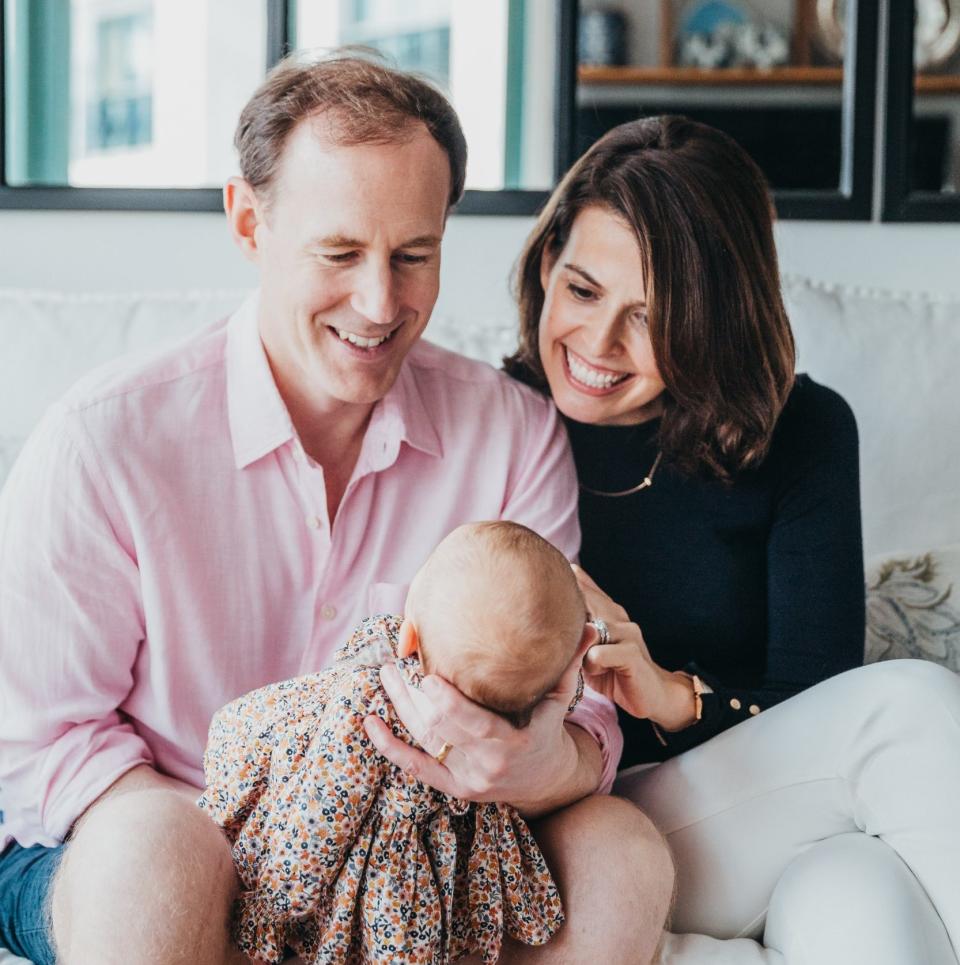
I was optimistic – I was feeling pretty good and my leg wasn’t too painful. But on holiday in the US at the end of 2021, I started feeling pain again, this time in my chest. A scan showed a shadow on my lung. When, at midnight, a doctor came into the room with my results I knew it would be terrible news. The sarcoma was back, along with three new tumours, two in my lungs and one in my ribs. From my research, I understood my probability of survival was now just 0.1 per cent.
It was very hard to take. I was in a foreign country, with a young baby, and I felt immense sadness about what I was about to put Nancy and Elizabeth through. Nancy and I had only been married for six years – I wanted to spend a whole life with her. As for Elizabeth… I wanted to see her grow, witness her first tummy rolls, meet her first boyfriend… Selfishly, I also wanted to shape who she became.
In the taxi back from the hospital, I rang a friend in Australia – the only person who’d be awake – and he calmed me down. At home, I broke the terrible news. Nancy and I came up with a plan. We’d move to the US, where we’d access the world’s best sarcoma doctors. Sarcoma grows incredibly fast – I’d have to start treatment immediately.
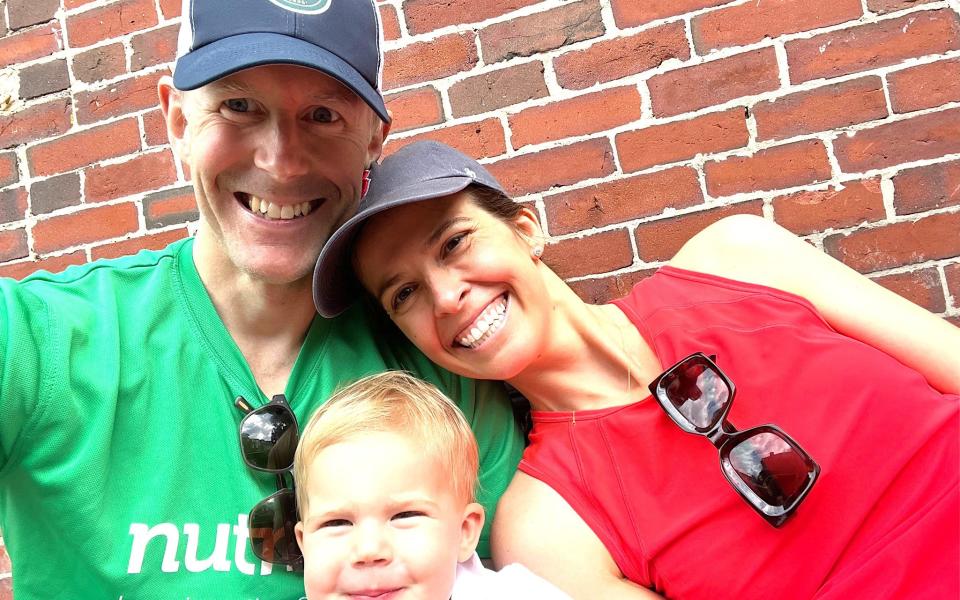
Since then, I have been on almost constant chemotherapy or radiotherapy, which have allowed me an extra 18 months of life. It’s like playing “whack-a-mole” – the tumours just keep popping up. Currently, I have over 30, some of which have caused fractures, including in my vertebrae. I am mostly in severe pain – shooting agony that makes me writhe around. I rely on strong painkillers.
The idea for Elizabeth’s Smile came to me in January 2022, when Nancy and I were both offered alternative therapies (massage and acupuncture) and family therapy to help us deal with our situation. JP Morgan had bought Nutmeg in 2021, so I was in a position to help others.
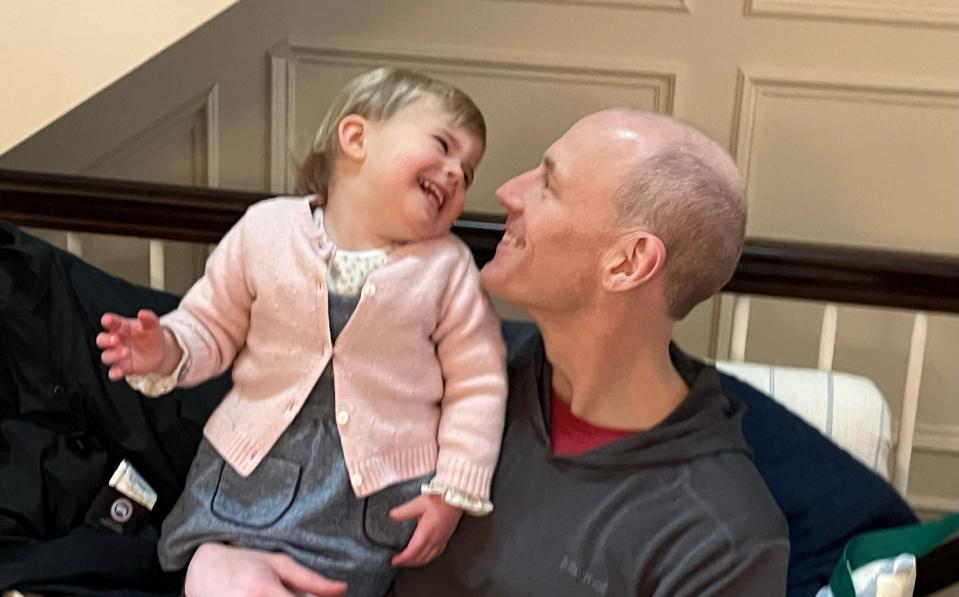
When I asked what they could do to help Elizabeth, they said there was nothing available for children, despite research showing that children suffer terribly after losing a parent, and face many negative outcomes. I said, I’m not going to accept this. My daughter is not going to be condemned to a lifetime of grief, worry or disadvantage because of my illness.
She is always smiling – which cheers everyone up – and I am determined that smile won’t stop after I have gone.
If I see a problem, I want to do something about it. Millions of children in the world are affected by parental death through terminal illness. I had to do something – starting now and continuing beyond the grave – that would prevent these vulnerable children from suffering any more than was necessary.
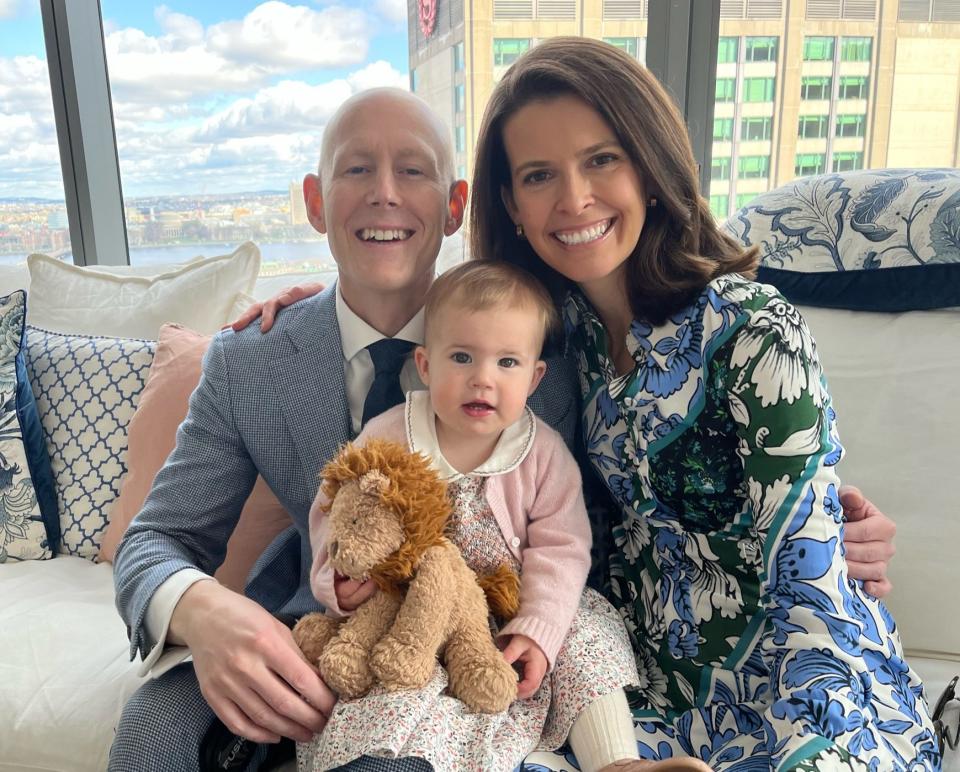
Elizabeth’s Smile will provide practical resources for children, initially in the UK and US, who lose a parent. Our aim is that children’s grief does not become suffering, so they can reach their full potential. Bereavement increases the risk of depression and contributes to difficulties at school and work, and problems forming relationships.
Elizabeth is too young to have active, internal memories of me, but I have done everything I can to show how much I love her. I’ve written letters and messages to be given to her in the future, and used an AI website to video myself answering hundreds of personal questions, so that one day she will be able to log on and “talk” to me to find out exactly who I was. She will have pictures, stories and access to my network of friends, so she will be able to build up a full picture of me. With Elizabeth’s Smile, countless other children will have the same opportunity to shape their knowledge of their loved one.
Children need honesty. People don’t wish to speak ill of the dead, so many bereaved children grow up thinking their late parent was a superhero. Which is never true, and is also unhelpful. I hope Elizabeth will hear all about the silly things that I did, and they will make her laugh and smile.
As told to Hilary Freeman
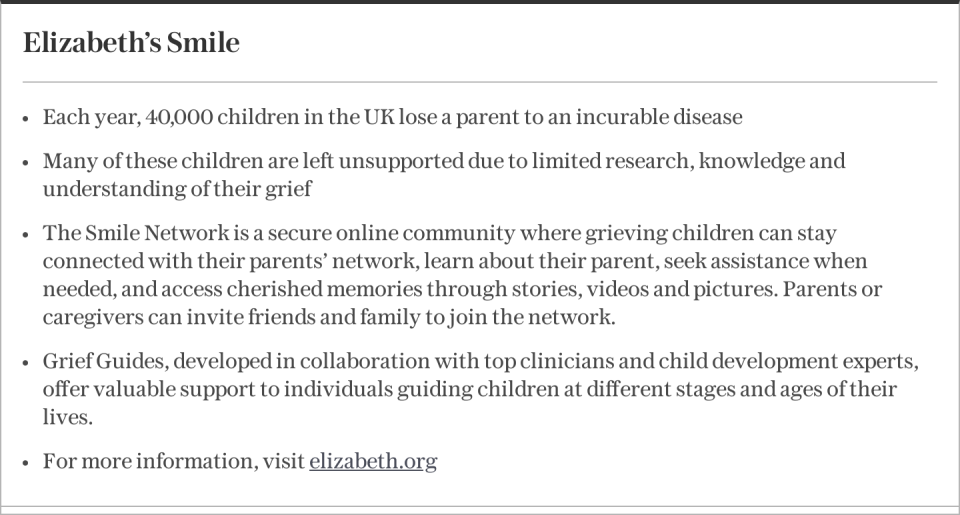
Read more: What is bone cancer and what are the symptoms to look out for?

